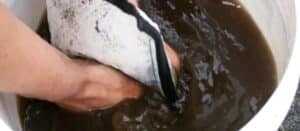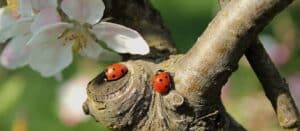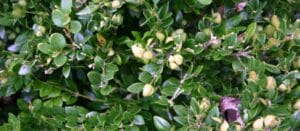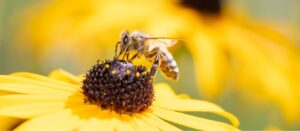You may think of wasps as being annoying garden intruders with a painful sting. But there are many wasps that are beneficial insects that not only won’t sting you, they also help rid your yard of destructive insect pests. Parasitic wasps are one type of “pest control crew” you’ll want to invite into your garden!
In this article, you’ll learn about the three beneficial parasitic wasps most commonly found in New Jersey and eastern Pennsylvania, as well as:
- What parasitic wasps do
- Which insect pests they target
- Whether or not they’re dangerous to humans (will they sting you?)
- Why you want beneficial insects, including wasps, in your garden
- How to attract parasitic wasps to your garden for natural pest control
What is a parasitic wasp?
Parasitic wasps are more accurately called “parasitoid” wasps because the wasp itself is not a parasite, it’s a beneficial predator. These wasps find insect pests, such as aphids and cutworms, and hijack them as incubators for the wasp’s own eggs.
What kinds of beneficial wasps will I find in my garden?
Parasitic wasps are nothing like the big wasps that build big, papery nests and torment us with painful stings. Parasitic wasps are pollinating insects who also happen to provide us with natural garden pest control by killing many of the insect pests we don’t want in our gardens.
New Jersey and eastern Pennsylvania have many species of parasitic wasps, but there are three most common types you’ll find (and want) in your garden: braconid, chalcid, and ichneumon wasps.
Braconid Wasps
Braconid wasps range in size from 1/16” to 1/4“ long. Braconids are often black or dark-colored, with long antennae and almost transparent wings.
These little wasps seek out aphids, tent caterpillars, and hornworms, and lay their eggs in the soft bodies of these pests. The female braconid wasp uses her ovipositor, an insect-specific organ, to insert her eggs into the host.
As the wasp larvae develop, they consume the pest insect. When these little beneficial wasps hatch, they fly off to find nectar for food and insect pests to host their eggs.
Worried about getting stung by a parasitic wasp? Many insect species, such as braconid wasps, have a stinger that’s part of their ovipositor. Females use their stinger’s venom to first paralyze a host insect before inserting their eggs. The good news is that the beneficial wasps you’ll find in your garden aren’t known for stinging anyone besides insect pests.
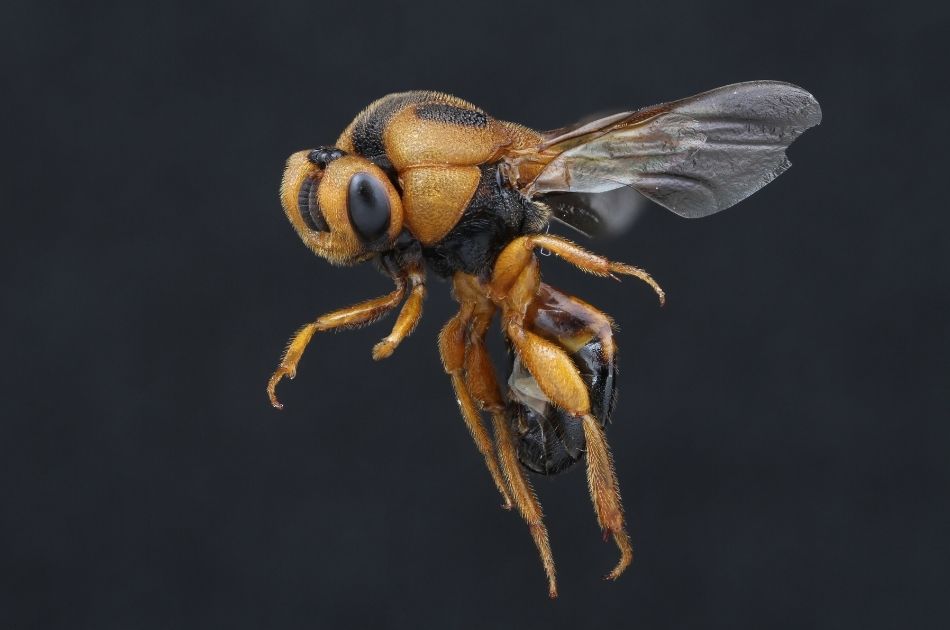
An extreme close-up of a chalcid wasp, a parasitic wasp that can improve landscapes and provide a natural form of pest control.
Chalcid Wasps
The chalcid wasp group has many members, including the extremely tiny trichogramma wasp, which is smaller than a pinhead and one of the smallest of all insects.
Commercial growers have long used trichogramma wasps in greenhouses, orchards, and fields to keep down pest populations. Because the trichogramma wasp is so tiny, it finds the eggs of pest insects and lays its eggs inside the pest egg. This is an especially effective way of reducing insect pest populations because the egg of the pest never hatches.
The chalcid wasps you’ll see in your garden look more like flies than wasps, with big eyes, transparent wings, and a metallic sheen or dark color. But you won’t find these helpful wasps buzzing around you; they’re busy pollinating and laying eggs in moth larvae, corn borers, and other pests.
Ichneumon Wasps
There are tens of thousands of species in this wasp family, and many of them are parasitoids that lay their eggs in other insects. You may see these in your garden because some ichneumon wasps can be 1/2” long. They’re often colored yellow and black and look like small cousins of the large wasps and yellow jackets that none of us like.
Please don’t kill these small wasps out of fear; they’re pollinating your plants and looking for hornworms, cabbage loopers, and corn borers, not you.
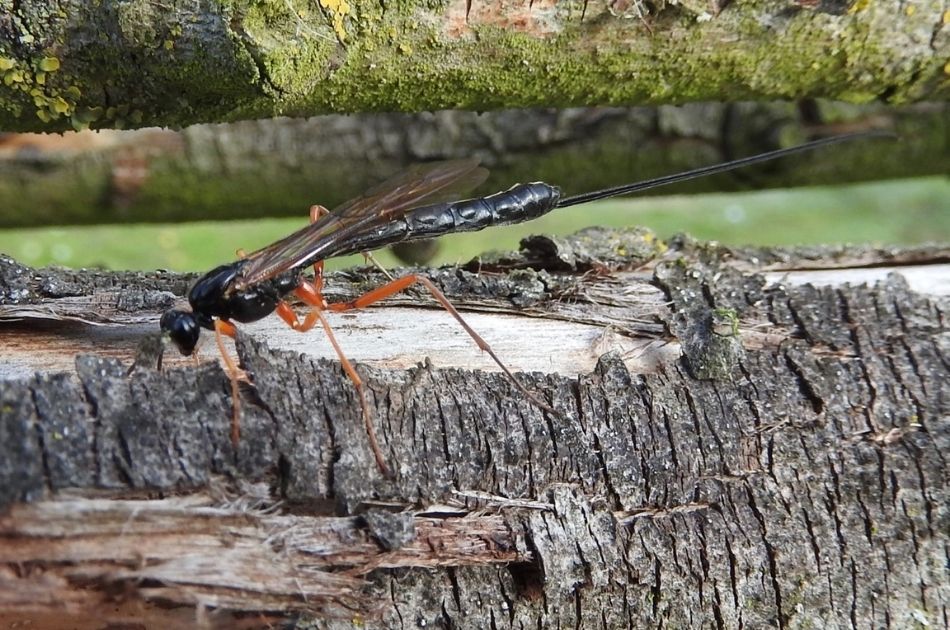
An ichneumon wasp, considered beneficial in New Jersey and Pennsylvania, is easier to spot because it’s larger than many other parasitoid wasps.
Why should I want parasitic wasps in my garden?
A healthy garden is full of all sorts of life, from beneficial microorganisms improving your soil to buzzing pollinators racing over your flowers to songbirds snapping up insects to feed their nestlings. And beneficial wasps are part of this busy world.
The two main reasons to invite parasitoid wasps to stop over in your garden are:
Parasitic wasps are good pollinators
These wasps live on nectar when they’re adults and visit many types of flowering plants and trees. Like honeybees and other pollinators, they carry pollen from plant to plant, often for long distances. We need all the pollinators we can get!
Parasitic wasps provide free pest management
Parasitic wasps do an enormously important service by reducing insect pest populations. Even if their work goes unseen by us, these little garden heroes are helping us have more productive gardens the natural way.
We are keenly aware of the damage commercial pesticides can do, which is why we focus our pest management practices on non-toxic alternatives. But there’s no way to replace the value that beneficial insect predators bring to our landscapes.
And if this isn’t enough reason to love parasitoid wasps, scientists are researching one wasp that targets Emerald Ash Borer (EAB) larvae. Since there is no way to stop EAB from ravaging our ash trees, this is a promising path of investigation.
Are parasitic wasps dangerous?
Not really. While you’d never be in danger from a wasp that’s 1/100th of an inch long (a trichogramma), some parasitoid wasps have stingers that could cause a painful sting on your skin. The good news is these insects don’t have any interest in you and will only sting if you’re bothering them on purpose—they’re not naturally aggressive.
If you’re really concerned, the best approach to take is to plant your flowering, nectar-producing plants a little distance away from where you sit or eat outside in your garden. Instead of putting yourself in the path of these pollinators and their stingers, you can design for everybody’s comfort by giving all garden visitors a little space.
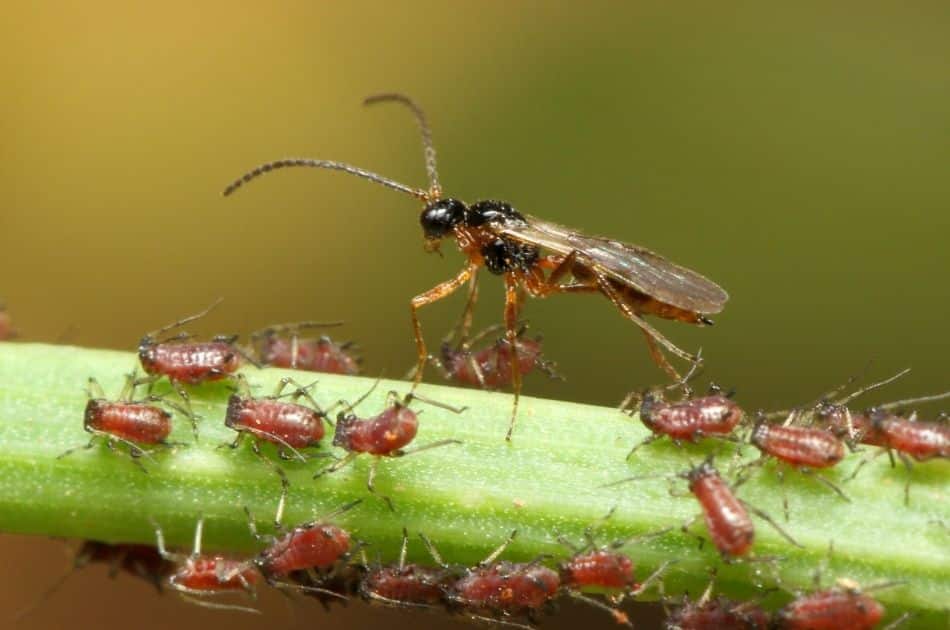
A braconid wasp is a natural pest control for aphids in your yard. By Alandmanson – Own work, CC BY 4.0, https://commons.wikimedia.org/w/index.php?curid=98939837
How can I tell if parasitic wasps are in my garden?
In a word, mummies. If you go looking (and you may need a magnifying glass), you’ll find empty cocoons and mummified eggs that are all that remain after the larvae of beneficial wasps have hatched. You may also find an empty, wrinkled casing attached to these mummies. These are the remains of the insect pest host that the wasp larvae consumed.
You may also find living insects, such as tomato hornworms, carrying on while covered in parasitic wasp eggs. While the hornworm may look grotesque as it struggles with these eggs atop it, it’s important that you don’t interfere.
Don’t pull the wasp eggs off the hornworm or pull the hornworm off the plant you find it on.
First, ask yourself why you would help a tomato hornworm at all, since it lives to eat your tomatoes! And second, remember that the hornworm won’t live for much longer, as the wasp larvae that cover it are consuming it as they grow. Leaving them to complete their development means you’ll soon have more pest-destroying parasitic wasps in your yard – and fewer pests.
PRO TIP: Another way you can find and help these beneficial wasps is to leave the foliage you find them on unpruned or uncut until the larvae have hatched. It’s a small concession to a manicured garden that will give you great rewards.
How can I attract beneficial wasps to my garden?
You can easily make your garden appealing to beneficial insects of all kinds, including parasitic wasps by taking a few simple steps:
Provide flowering plants. Pollinators and nectar-eating insects will fly to a wide range of flowering plant species, from groundcovers to trees. If you supply nectar sources, the beneficial wasps will find them.
Provide water. Water, especially during hot summer weather, is vital to all beneficial insects. You can use a shallow bowl or a birdbath to give your garden visitors water.
Because honeybees and other pollinators aren’t swimmers, you should include a few flat pebbles or rocks and keep their tops above the water level. A flat “landing strip” rock will allow your friendly beneficial insects to alight on the stone and reach the edge of the water to drink.
We Can Help
If you’re interested in adding beneficial insects to your garden or want to know more about non-toxic garden pest control (including for ticks and mosquitoes) give us a call. Our business is keeping your garden and your trees healthy, vigorous, and safe, and we take pride in giving our customers the best service they can find.
GET THE LATEST NEWS
Subscribe to the Organic Plant Care Newsletter and get timely and helpful tips and updates monthly.
There's no spam - we promise!

